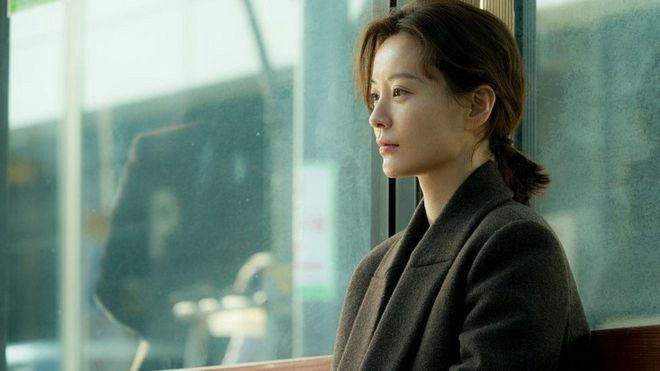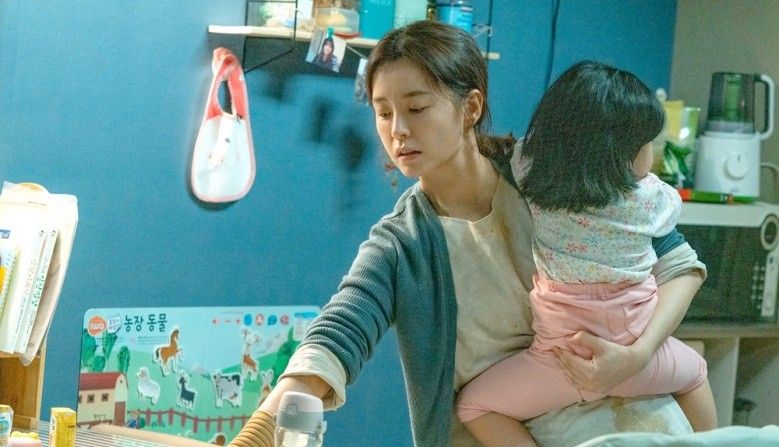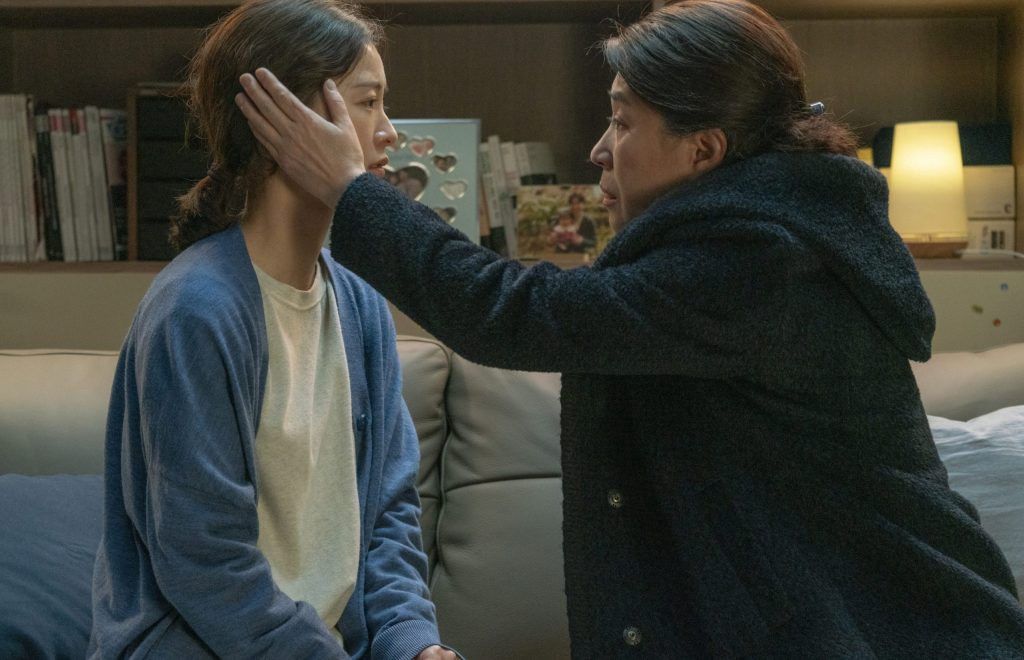When the novel Kim Ji-young, Born 1982 was published in 2016, its unabashed handling of gender discrimination and mental health in South Korea made it a cultural phenomenon. Three years later, its film release again ignited debates. Main character Kim Ji-young, portrayed by Jung Yu-mi, struggles with post-partum depression while flashbacks depict the everyday casual sexism she has suffered from men and women alike. The Asian female audience will no doubt recognize many of these transgressions: slow job progression once taking maternity leaves becomes a possibility, rigid expectations of the wife to focus on a family once she bears a child, and the looking down upon housewives as unproductive once they choose to stay home.
Critics have focused on many aspects of the material and reactions to it: men rating the movie 0 simply because it dares to spotlight sexism, men breaking up with their girlfriends for simply suggesting to watch the movie, men crowdfunding a parody book Kim Ji-hoon, Born 1990 highlighting discrimination against the common man. Commentators have broken down male reactions significantly. They believe military conscription unfair to men, believe women have unfair advantages in the workplace, believe their positions threatened because feminism has dared to surface in a deeply patriarchal society. Kim Ji-Young, Born 1982 is a movie that, to them, condemns the societal order that they have been accustomed to. Yet, while Kim Ji-Young, Born 1982 does focus on spotlighting patriarchy, it’s also a story of resilience and resistance. There’s enough said about how Kim Ji-young, Born 1982 has affected its male audiences: it made them angry, dejected, unbelieving. The focus should be on how it has affected its female audiences instead.
Personally, Kim Ji-young, Born 1982 was extremely powerful because I saw my family reflected in it.
Like Ji-young, my mother gave up her career to take care of me. In part because my father earned much more than my mother, in part because she extremely valued family and wanted the best upbringing I could get, and in part because we didn’t have good access to childcare, my mother left her position managing a local bank to manage a household.

Watching Kim Ji-young, Born 1982, I was incredibly appreciative of how Ji-young’s identity as a mother and housewife was handled. It’s a perceptive, realistic portrayal validating how integral and challenging caretaking is, and it passes no judgment on a woman’s choice of staying home and taking care of a family. I was skeptical upon beginning the movie; I’ve felt that many times modern feminist rhetoric has internalized many stereotypes about stay-at-home mothers. A strong woman should be economically independent and vocal, and housewifery has even been portrayed as oppressing to the modern woman. Somehow, in our rhetoric we’ve forgotten that feminism is about celebrating women’s choices — sometimes, these choices involve family over career.
My mother has kept her Employee of the Year Award on her nightstand for the past twenty years, but when I ask her if she regrets quitting her job to take care of me, she always says it was the best decision she ever made. I see this dynamic in Kim Ji-young, Born 1982 as well. Ji-young struggles with choosing to return to work and continuing to take care of her daughter, and negative reviews have latched on to this struggle as proof that Kim Ji-Young, Born 1982 threatens the status of the nuclear family and denigrates women that choose to become caretaker.
However, Ji-young, like my mother, never displays outward regret against her choice to become a housewife or sacrifice her career for family. If it did Ji-young would have gone directly to work once she realizes she wants to return to work. Instead, she works through how to balance raising her child with her husband, receives treatment for her depression, and waits until her and her husband are in a good enough position to switch roles. Though lapses in her attentiveness are used to emphasize her depressive moods, she’s never portrayed as unwilling to take care of her child and never endangers her child in any way.
This movie doesn’t take a stand against a woman choosing motherhood or caretaking, it takes a stand against society’s expectations for a woman to choose motherhood and caretaking. The movie highlights obstacles that force women back into domestic spheres — limited job advancement, familial pressures, not enough support for childcare — but it isn’t a statement against stay-at-home mothers or housewives. I would even argue that the movie celebrates them. It portrays Ji-young and her mother as resilient, persistent, and loving to their families. And I’m extremely appreciative of how the movie undermines stereotypes of caretaking as easy: Ji-young’s constantly busy ensuring her daughter gets the best care, her husband can come home to a good meal, and her family can live in a clean house.
To its female viewers, Kim Ji-young, Born 1982 is also especially captivating because Kim Ji-young represents the everyday woman. Her name is an extremely common Korean female name. She’s styled in simple, muted tones. She was an average office worker.

Indeed, Kim Ji-young may not match the classic feminist character archetype at first glance. Her sister seems much more feminist, rejecting marriage, not having kids, and pursuing her own career. Kim Ji-young starts off as compliant. She’s the quiet, sacrificial housewife. Her goals are modest: she just wants to reenter the workforce, be it as a bakery attendant or office worker. She isn’t a radical firebrand trying to overturn the patriarchy at every moment, but just a woman trying to balance expectations while living out her truth. This is what makes the movie so powerful. In a review on Bangkok Post, critic Melalin Mahavongtrakul writes:
“Part of why the film is so impactful comes from how ordinary it feels. Ji-young could be anyone. She is all of us. She is not a larger-than-life character or a heroine in a big blockbuster. ”
Kim Ji-young is relatable precisely because of her averageness. Her story isn’t that special. As women, especially as Asian women, we’re all familiar and likely all know others going through the same challenges Ji-young faces: post-partum depression, the tedious, repetitive work of caretaking, not enough appreciation from her spouse and family. What’s special is that, despite its everydayness, this story is being told. It’s recognition and affirmation that a woman’s day-to-day struggles are valid.
Yet, the fact that such a matter-of-fact presentation of an everyday woman’s life is branded extreme by Korean society demonstrates just how unprecedented paying attention to female feelings and female experiences are. Women are constantly doing more emotional labor for men and for families. But when we want to ask others to listen to our voices, our problems, and our narratives, we are unacknowledged and shut-out. I felt extremely frustrated at many points in the movie, wanting to shout at Kim Ji-young for why she wouldn’t speak up more or just be less passive, not realizing that she needs to get comfortable with using her voice first. Ji-young has been taught her entire life that her voice matters less and has gotten accustomed to staying silent; now, she finds her voice hard to conjure.
Jamie Chang, Ewha Womans University professor and translator for the book Kim Ji-young, Born 1982, also points out another obstacle for the character:
“Kim Ji-young’s struggle comes from being told for a very long time that there is gender equality now and women can do what they want to do.”
We can vote. We can drive. We can pursue any career we want. To many, this proves that gender equality has been achieved, and women who continue to criticize gender structures are merely complaining. Their opinions are thus invalidated by society. Often women silence their own voices as well — the disparity between what women are told (“there is gender equality now”) and what women experience (casual sexism) can cause us to question the validity of our own struggles. But Kim Ji-young, Born 1982, by daring to bring casual sexism into the spotlight, assures us that our struggles are real.

Loss of voice features prominently in Kim Ji-young, Born 1982. Having just had a child, lacking support at home, receiving judgment for being a housewife, and juggling expectations to defer to traditions, Ji-young develops postpartum depression; one of her symptoms involves taking on the personas of her mother and grandmother to express what she truly feels. On Chuseok, a traditional Korean holiday in which families honor their ancestors, Ji-young watches as the rest of her husband’s family banters in the living room while she has to prepare for festivities at her mother-in-law’s place, unable to visit her own family as she is expected to visit and attend to her husband’s family instead. She suddenly channels her mother’s voice and throws down her work, confronting her mother-in-law that she wishes to see her own family as well. When Ji-young’s mother visits the city upon hearing that Ji-young is dealing with postpartum depression, Ji-young channels her grandmother and chides her mother for giving up her education to work and put her brothers through school instead.
Some critics have chosen to focus on Ji-young’s loss of voice as proof that she loses her identity and agency — she’s unable to assert herself unless she becomes someone else. I view it differently, however. I see this development as solidarity, as unity, as a lineage of women coming together to protect Kim Ji-young and express their frustrations at unrecognized sacrifices. Ji-young regains her voice and rebuilds her identity through this process.
Not all women are supportive, however. A major theme of the movie involves internalized misogyny. Indeed, many of the expectations stressing Ji-young out are placed on her by her mother-in-law, who constantly worries over if Ji-young is dedicated enough to her family and to raising her child. Here we see an interesting dichotomy. Whereas both her mother-in-law and her mother have grown up under the same misogynistic conditions, her mother-in-law imposes expectations on Ji-young while her own mother helps Ji-young subvert them. I found this difference clever, again emphasizing the strength of family. Though her mother persevered through the casual sexism and expectations imposed on her, she realizes how detrimental they are when she witnesses the effects they have on her daughter.
It’s easy to stereotype many of the issues brought up by Kim Ji-young, Born 1982 to Asian society. Yet, as its translator Jamie Chung puts it,
“I think we tell ourselves there are certain aspects of misogyny that is specific to Korea or Eastern culture and doesn’t happen anywhere else in the world but that’s not true.”
Reduced career mobility, devaluation of care-oriented work, expectations for women to be more family-oriented — the appeal of Kim Ji-young, Born 1982 is that it utilizes a relatable character to tackle universal themes. Though the movie definitely has provoked East Asian audiences to take an inward look on gender structures, its themes are relevant to us in the West as well. We devalue “women’s work,” often caretaking or service jobs disproportionately undertaken by women. The glass ceiling is still very much in existence. And we consider housewives as unproductive members of society:
“‘What do you want to be then?’ he said. And I replied, ‘I want to be a housewife — a mother. And I was baffled (still am) about his response to my proud answer. His first response was “Seriously?” with that awful tone of disgust. And then he followed this up with possibly the worst question I have ever been asked, “Don’t you want to contribute to society?” And ever since that moment, I realized how mistaken and shallow people could be in the way they define and measure the intangibles of the world.”
— Cheska Samaco, Thought Catalog
A stay-at-home parent is an occupation that has the longest hours in our society. Work is 24/7. There is no vacation policy. There is no breakfast, lunch, or dinner break because making breakfast, lunch, and dinner is your job. And there is no room for advancement either. This is te same whether in Asia or in America.
We dislike criticism. When confronted with a book and movie like Kim Ji-young, Born 1982, we like to think that the issues brought up only exist elsewhere, in Korean and Eastern societies long acknowledged to be misogynistic. We compare the progress we’ve made in our societies against others and say that we have a more equitable country. This is an argument often seen online. Taken to the extreme, when women of more developed countries point out everyday experiences of casual sexism, critics point out how women from other countries or other cultures lack more rights and accuse the women of unreasonably complaining. Kim Ji-young, Born 1982’s universality should remind us that these issues are global and deserving of attention.
Many efforts around the world are working to spotlight the everyday experience. Hollaback collects stories around street harassment, along with providing intervention training. “The Everyday Sexism Project” is a collection of stories by real women around the globe detailing transgressions, small and large, that they’ve experienced in real life. News outlets such as The New York Times, The Guardian, and more have begun to examine casual sexism. As Kim Ji-young, Born 1982 has demonstrated, the everyday woman and her everyday stories are worth examining, worth fighting for, and worth telling.

Comments powered by Talkyard.